
The speaker of the United States House of Representatives, commonly known as the speaker of the House, is the presiding officer of the United States House of Representatives. The office was established in 1789 by Article I, Section II, of the U.S. Constitution. By custom and House rules, the speaker is the political and parliamentary leader of the House and is simultaneously its presiding officer, de facto leader of the body's majority party, and the institution's administrative head. Speakers also perform various other administrative and procedural functions. Given these several roles and responsibilities, the speaker usually does not personally preside over debates—that duty is instead delegated to members of the House from the majority party—nor regularly participate in floor debates.

The Speaker of the House of Commons is the presiding officer of the House of Commons, the lower house and primary chamber of the Parliament of the United Kingdom. The current speaker, Lindsay Hoyle, was elected Speaker on 4 November 2019, following the retirement of John Bercow. Hoyle began his first full parliamentary term in the role on 17 December 2019, having been unanimously re-elected after the 2019 general election.
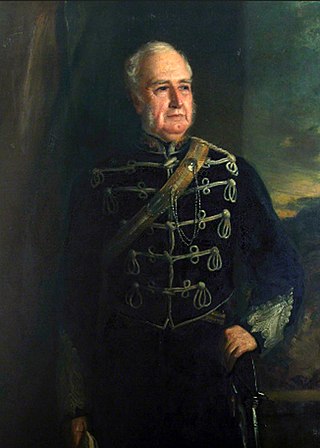
Charles Shaw-Lefevre, 1st Viscount Eversley, GCB, PC, was a British Whig politician. He served as Speaker of the House of Commons from 1839 to 1857. He is the second-longest serving Speaker of the House of Commons, behind Arthur Onslow.

Arthur Wellesley Peel, 1st Viscount Peel,, was a British Liberal politician, who sat in the House of Commons from 1865 to 1895. He was Speaker of the House of Commons from 1884 until 1895, when he was raised to the peerage.
Charles Shaw-Lefevre may refer to:
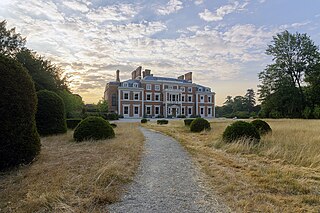
A country estate of 438 acres, the heart of Heckfield Place is a Georgian Grade II listed manor house, located in Hampshire, United Kingdom. It was built between 1763 and 1766 for Jane Hawley (1744–1815), it was enlarged by the Shaw Lefevre family who lived in the estate from 1786 to 1895. In the 20th century, it was owned by the family of Col Horace Walpole before being sold to Racal Electronics plc. and converted to a conference and training centre in 1981–1982.

Sir John Watson Gordon was a Scottish portrait painter and president of the Royal Scottish Academy.
Plural voting is the practice whereby one person might be able to vote multiple times in an election. It is not to be confused with a plurality voting system which does not necessarily involve plural voting. Weighted voting is a generalisation of plural voting.
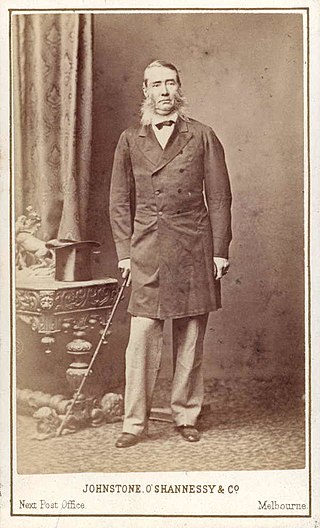
John Henry Thomas Manners-Sutton, 3rd Viscount Canterbury, styled The Hon. John Manners-Sutton between 1814 and 1866 and Sir John Manners-Sutton between 1866 and 1869, was a British Tory politician and colonial administrator.

The Parliamentary and Financial Secretary to the Admiralty also known as the Parliamentary and Financial Secretary to the Board of Admiralty was a position on the Board of Admiralty and a civil officer of the British Royal Navy. It was usually filled by a Member of Parliament. Although he attended Board of Admiralty meetings informally he was not made a full member of that Board until 1929. He served as the deputy to the First Lord of the Admiralty in Parliament and was mainly responsible for all naval finance and spending proposals from 1625 until 1959.

George John Shaw Lefevre, 1st Baron Eversley was a British Liberal Party politician. In a ministerial career that spanned thirty years, he was twice First Commissioner of Works and also served as Postmaster General and President of the Local Government Board.

John Smith (1656–1723) of Tedworth House, Hampshire, was an English politician who sat in the English and British House of Commons between 1678 and 1723. He served as Speaker and twice as Chancellor of the Exchequer.

Petersfield was an English Parliamentary constituency centred on the town of Petersfield in Hampshire. It existed for several hundred years until its abolition for the 1983 general election.
Lefèvre is a common family name derived from the original northern French surname Lefebvre. Common variations include Lefevre, LeFevre, Le Fevre, le Fevre, Le Fèvre, le Fèvre, LeFever, Lefevere, Le Fêvre and le Fêvre.
Charles Shaw Lefevre, born Charles Shaw, was a British Whig politician.
Shaw Lefevre was a double-barrelled surname created in 1789 through the marriage of Charles Shaw and Helena Lefevre. It was never hyphenated. The surname was held by a total of 24 people, and became extinct in 1936.

Lawrence James Baker was an English stockbroker and a Liberal politician who sat in the House of Commons from 1885 to 1886.

William Shaw"of the strand" (1797–1853) was a British agricultural writer, editor and translator, first editor of the agricultural journal Mark Lane Express, and of The Farmer's almanac and calendar, and co-founder of the Farmers Club in 1842. He is known for advocating agricultural reforms and improvements.
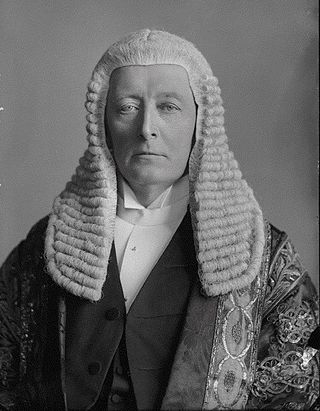
The 1895 election of the Speaker of the House of Commons occurred on 10 April 1895, following the retirement of the previous Speaker Arthur Wellesley Peel. The election resulted in the election of Liberal MP William Court Gully by the narrow margin of 11 votes. It was the first contested Speaker election since 27 May 1839. The next contested election would not be for another 56 years, until 31 October 1951.
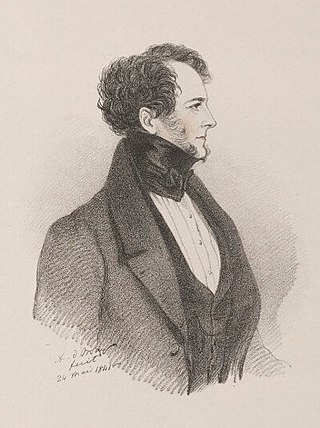
Sir Henry St John Carew St John-Mildmay, 4th Baronet, of Dogmersfield Park, Hampshire, was an English politician.

















